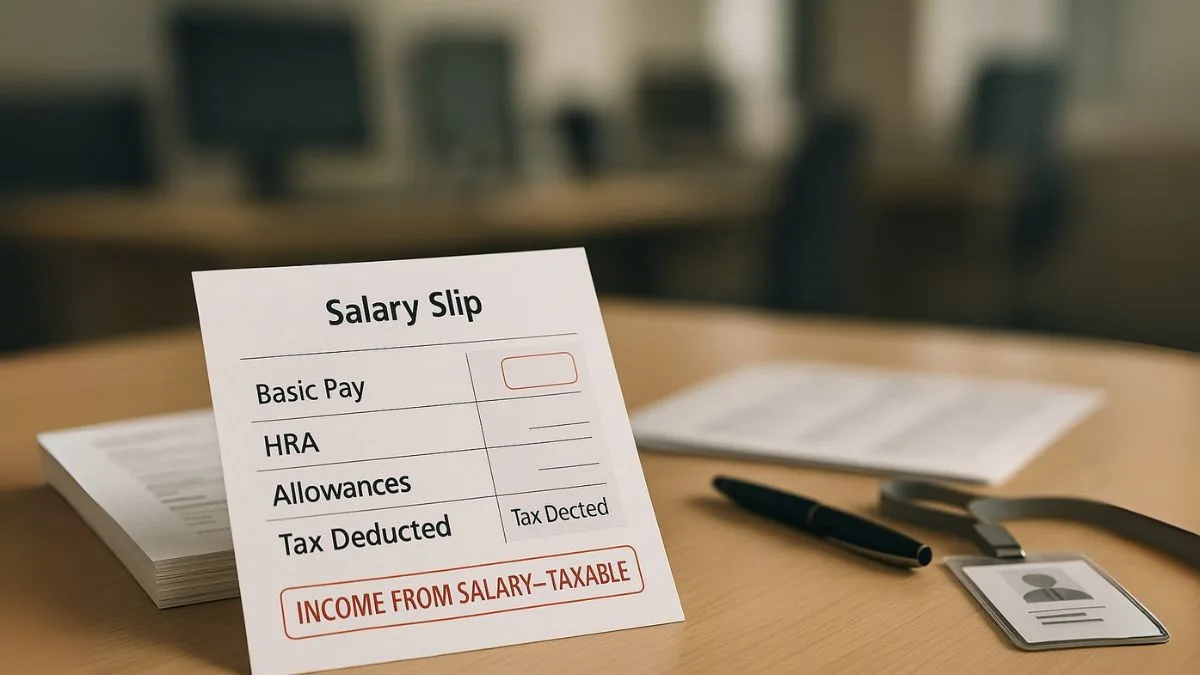
If you earn a salary in India, taxes follow you every month.
That’s fine—because salary tax isn’t punishment; it’s part of how our system runs.
Still, knowing how it’s calculated can save you a lot each year.
Let’s break down what the salary section in income tax really covers, which sections apply, & how you can keep more of what you earn—legally.
What “Salary” Actually Means
Under the Income Tax Act 1961, salary is everything you receive from your employer for your work.
Not just your basic pay.
It includes bonuses, commissions, allowances, pensions, perquisites, and sometimes even benefits that aren’t paid in cash.
Sections 15, 16 and 17 are your rule-book:
- Section 15 → When salary becomes taxable
- Section 16 → What deductions you can claim
- Section 17 → Defines “salary”, “perquisites”, and “profits in lieu of salary”
Once you know these three, salary taxation stops feeling mysterious.
When Does Salary Become Taxable? (Section 15)
Under Section 15, your salary is taxed when it’s due or received—whichever happens first.
That means:
- March salary paid in April? Still taxed in March’s financial year.
- Advance salary? Taxed right away."
The idea is simple—no pushing income to another year to dodge tax.
Also Read: Decoding Salary, Perquisites, and Profits instead of Salary
Section 16 – The Three Core Deductions
1️⃣ Standard Deduction – ₹ 50,000 for every salaried employee.
2️⃣ Entertainment Allowance – Only for government employees.
3️⃣ Professional Tax – Whatever state tax you pay, fully deductible.
These small lines on Form 16 make a big difference in your final refund.
Section 17 – What All Counts as Salary
1. Salary Components
Basic Pay, DA, bonus, commission, pension, gratuity, & leave encashment (up to limits under Section 10(10AA)).
2. Perquisites (Fringe Benefits)
- Company car, rent-free house, paid utilities, club fees, or insurance."
- Rule 3 of the Income-Tax Rules explains how to value them.
3. Profits in Lieu of Salary
Payments received instead of salary—like severance pay, VRS amount, or pre-joining bonuses.
Add all three & you have your gross taxable salary.
Allowances & Exemptions
Employers often pay allowances for specific needs:
- HRA – Section 10(13A)
- LTA – Section 10(5)
- Driver’s salary / conveyance – if strictly for office work
Keep receipts; the exemption only stands when proof exists.
TDS on Salary (Section 192)
- Every month, your employer deducts TDS under Section 192.
- It’s based on your total income after exemptions & deductions.
- The amount appears in Form 26AS and your Form 16 at year-end.
Think of it as pay-as-you-earn tax so you’re not hit by a lump sum later.
Also Read: Income Tax Relief on Salary Arrears and Advance Salary
Leave Salary & Retirement Benefits
- Government staff: leave encashment on retirement → fully exempt.
- Private employees: exempt up to ₹ 3 lakh under Section 10(10AA).
- Gratuity, pension, and VRS payments: partly exempt under other clauses of Section 10.
These rules protect your post-retirement peace of mind.
Other Reliefs for Salaried Taxpayers
You can further trim tax through:
- 80C – PF, ELSS, LIC (₹ 1.5 lakh limit)
- 80D – Health insurance premiums
- 80TTA/80TTB – Savings-interest deduction
- 89(1) – Relief on arrears or advance salary
Mixing these right can drop your effective tax rate dramatically.
Filing Your ITR
Even if TDS is already cut, file ITR-1 or ITR-2 if you:
- Earn from other sources,
- Expect a refund, or
- Want to carry forward losses.
Filing is your proof of compliance & the easiest way to unlock refunds.
Quick Example
|
Component |
Amount (₹) |
|
Basic Salary |
6,00,000 |
|
HRA |
2,00,000 |
|
Other Allowances |
80,000 |
|
Employer PF |
50,000 |
|
Less: HRA Exemption |
(1,20,000) |
|
Less: Professional Tax |
(2,500) |
|
Less: Standard Deduction |
(50,000) |
|
Taxable Salary |
7,57,500 |
Now apply slab rates—and you’ll know your exact liability.
Common Myths
- “TDS means no ITR.” → Wrong. Return still required.
- “Only cash salary is taxed.” → Perks count too."
- “All allowances are free.” → Each has limits.
Knowing the facts keeps you safe from notices.
Also Read: Section 80TTB of Income Tax Act: A Lifesaver for Senior Citizens
Key Points
- Salary income governed by Sections 15 to 17.
- TDS → Section 192, Deductions → Section 16, Exemptions → Section 10.
- Salary is taxable when due or received, whichever first.
- Use your 80-series deductions to cut tax legally.
Conclusion
Once you know what’s taxable & what isn’t, tax-planning feels less like math and more like smart budgeting.
Sections 15, 16 and 17 give every employee a clear, fair system—no surprises, no loopholes.
Still puzzled about how your perks or arrears will be taxed?
👉 Visit CallMyCA.com — our Chartered Accountants will break down your payslip, calculate exact TDS, & help you claim every legal deduction under the salary section in income tax—without spreadsheets or stress.











